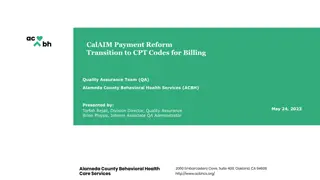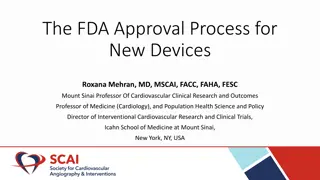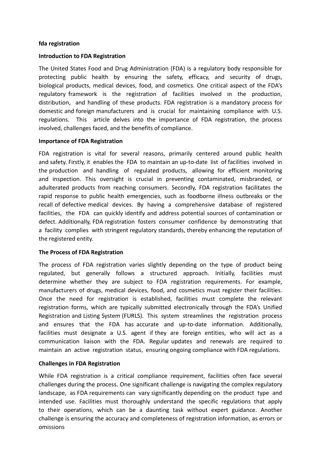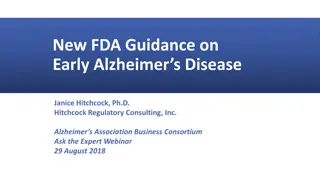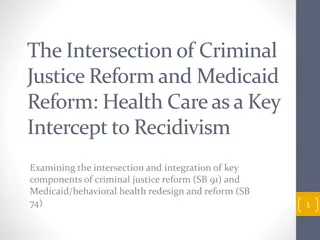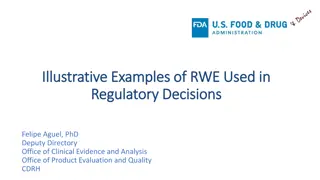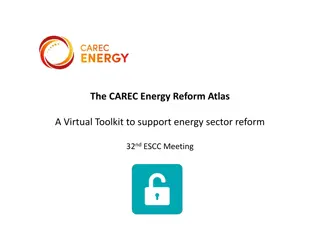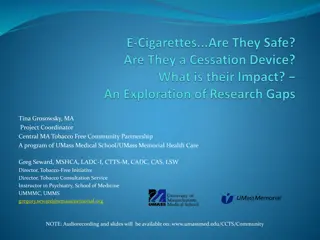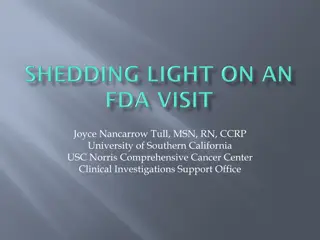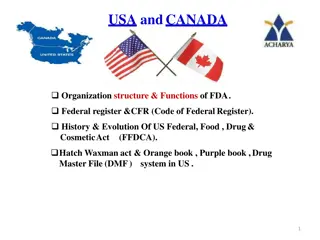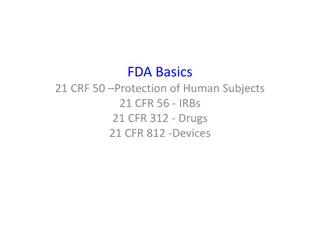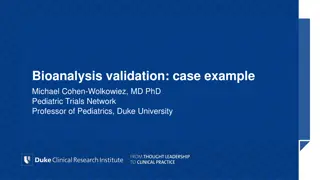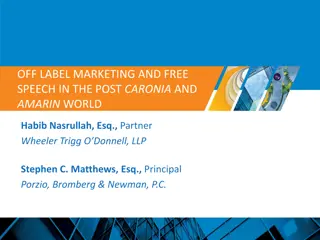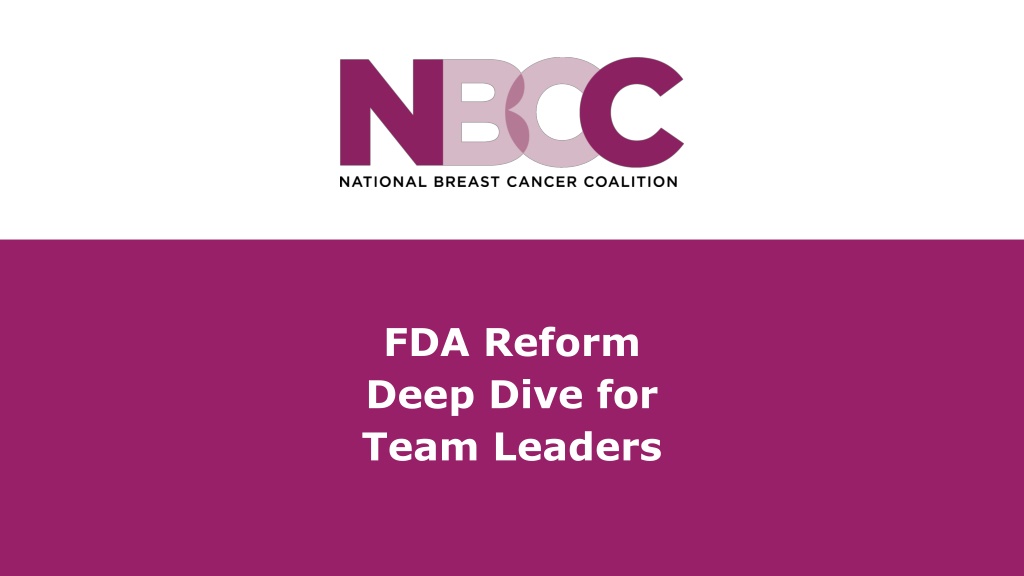
FDA Reform and Accelerated Approval: Challenges and Solutions
The Food and Drug Administration (FDA) plays a crucial role in ensuring the safety and efficacy of new drugs, but issues like accelerated approvals with surrogate endpoints and confirmatory trials have raised concerns. The Accelerated Approval (AA) process, initially introduced during the HIV/AIDS crisis and now heavily used in oncology, faces challenges with transparency and confirming clinical benefits. Confirmatory trials post-accelerated approval are vital for verifying predicted benefits, but the system's shortcomings can lead to delays and uncertainties in drug approval. Addressing these challenges is crucial to maintaining public trust and ensuring safe, effective healthcare interventions.
Download Presentation

Please find below an Image/Link to download the presentation.
The content on the website is provided AS IS for your information and personal use only. It may not be sold, licensed, or shared on other websites without obtaining consent from the author. Download presentation by click this link. If you encounter any issues during the download, it is possible that the publisher has removed the file from their server.
E N D
Presentation Transcript
FDA Reform Deep Dive for Team Leaders
Access to Care is the Foundation NBCC s first priority is access to quality healthcare for all In order to achieve this, everyone must have access to interventions that work and are safe and affordable. The Food and Drug Administration(FDA) plays a vital role The FDA must approve drugs with clinically meaningful benefits for patients for breast cancer, this means an increase in overall survival or quality of life.
FDA: The Problem Responsible for protecting the public by ensuring the safety and efficacy of new drugs and other medical interventions Patients expect that are receiving a safe and effective drug when they are offered an FDA-approved drug/biologic. Unfortunately, this expectation is not met in many cases.
Accelerated Approval Established in 1992 Allows for earlier approval based on surrogate endpoints Intermediate endpoint (i.e., tumor shrinkage) reasonably likely to predict clinical benefit Substitutes for a direct measure of clinical benefit Often, surrogate endpoints fail to correlate with clinical benefit Intended to treat serious conditions and Meet an unmet medical need
Accelerated Approval First established to address need during HIV/AIDS crisis Oncology drugs now have largest share of AA Serious erosion of trust in program due to lack of transparency and failure to confirm clinical benefit
AA: Confirmatory Trials Current law grants FDA the authority to require drug sponsors to conduct confirmatory trials after accelerated approval to verify that the drug or biologic provides the predicted clinical benefit. Upon completion of the confirmatory trial, if they demonstrate true benefit, the accelerated approval is converted to regular approval. Sponsor fails to conduct confirmatory trial The trials fail to verify the predicted benefit FDA can withdraw approval if: The trials demonstrate that the product is not safe or effective Sponsor disseminates false or misleading promotional material
AA: The Problem Removing drugs approved via accelerated approval has proven to be cumbersome and can take months or even years. Creates a drug approval system that allows drugs to come to market and stay on the market without evidence of clinical benefit. These drugs all carry toxicities, and many have an extraordinary financial cost.
Examples Bevacizumab is a drug with substantial toxicity. The US FDA requires that Avastin display a Black Box Warning in the drug s professional product leaflet. Avastin (bevacizumab) Feb. 2008 Accelerated Approval for mBC Results of 2 confirmatory trials released in 2010. Jul. 2010 ODAC voted 12-1 to revoke the accelerated approval. Dec. 2010 FDA initiated the process to withdraw. Jan. 2011 The drug sponsor requested a hearing. Jun. 2011 ODAC hearing Nov. 2011 Avastin withdrawn for metastatic breast cancer Others: Atezolizumab for TNBC AA in March 2019; Voluntarily withdrawn in 2021. Note: ODAC had voted to keep it on the market.
Modest AA Reforms Made Last Year 2022 Omnibus spending bill passed modest AA reforms: Allows (but does not mandate) post-approval studies to be underway or completed within a defined timeline prior to approval being granted. Increases post-approval reporting from annually to every six months. Creates an Accelerated Approval Council at FDA Tasked with ensuring consistent and appropriate use of AA across the FDA Council must publish annual report
FDA Draft Guidance-Improving Oncology Clinical Trial Draft Guidance on the design of clinical trials Design, conduct, and analysis of data through two kinds of clinical trial design Two separate controlled trials One trial for both AA and to confirm clinical benefit NBCC preparing comments to the Draft Guidance.
Legislative Efforts 2022 FDA User Fee Reauthorization Post-approval studies must be agreed to by the time of accelerated approval. FDA may require post-approval studies of such drugs to be underway prior to approval. Amend the procedures by which FDA can withdraw an accelerated approval. None of these reforms were passed as part of the FDA User Fee Reauthorization legislation
Legislative Efforts Accelerated Approval Integrity Act (Pallone) 117th No Senate companion legislation, no cosponsors Codifies FDA authority to require sponsors complete confirmatory trials on drugs that receive AA. Require sponsors to enter into an agreement with the FDA on how the confirmatory trials be conducted, including enrollment targets, study protocols, and target study end date. Sets a five-year limit on how long a drug can stay on the market without confirmation of clinical benefit.
ICER Recommendations: FDA Strengthen Strengthen the selection of surrogate endpoints Increase Increase consistency and clarify evidence standards to explain use of AA Require Require greater use of randomized controlled trials Create Create new label alert and patient material for AA drugs Increase Increase enforcement of requirements to complete confirmatory trials Withdraw Automatically withdraw approval for drugs lacking confirmatory evidence Create Create a safety only approval pathway waive insurance coverage requirements
ICER Recommendations: Payer/Industry Increasing mandatory federal rebate levels until the time of full approval Pricing at marginal cost to incentivize completion of confirmatory trials Require payment to be based on outcomes- based contracts
What Can We Do? Work with Congress to draft and support appropriate legislative fixes, educate our advocates to understand the problems with AA and other FDA issues Congress must consider reforms to accelerated approval to ensure that drugs are safe and effective for patients and have actual clinical benefit. The FDA should impose strict timelines for the initiation of confirmatory trials and require the use of clinically meaningful endpoints. The FDA should have the authority to quickly withdraw accelerated approval if a confirmatory trial has not been initiated or timely completed and/or the drug fails to confirm clinical benefit.
Summit Sessions--FDA Sunday, May 7 2:15-3:15 PM Workshop History of the FDA and the Birth of Accelerated Approval Speaker: Lewis Grossman, JD, Professor, Washington College of Law, American University Moderator: Christine Norton, NBCC Board of Directors, Minnesota Breast Cancer Coalition Sunday, May 7 3:00PM - 5:15 PM Plenary Session How Do We Know What Works? What Should We Pay For It? Speakers: o Anna Kaltenboeck, MA, MBA, Principal, ATI Advisory o Lewis Grossman, JD, PhD, Professor, Washington College of Law, American University o Reshma Ramachandran MD, MPP, MHS, Assistant Professor of Medicine, Collaboration for Regulatory Rigor, Integrity, and Transparency, Yale University o Beth Emery, JD, NBCC Board of Trustees; NBCC Board of Directors Alternate, Alamo Breast Cancer Foundation


